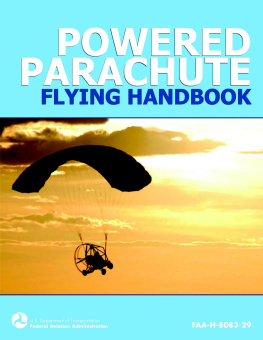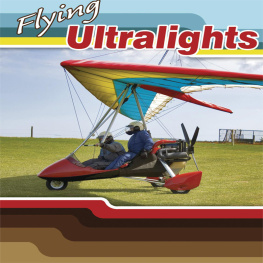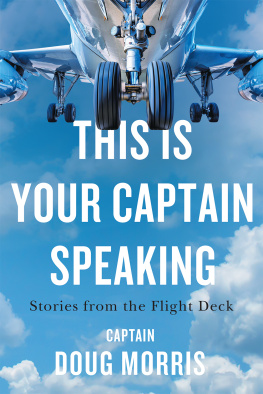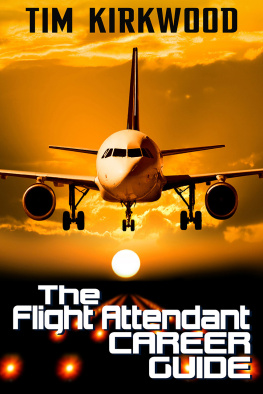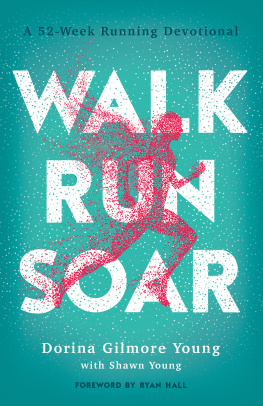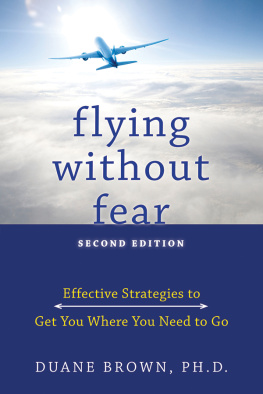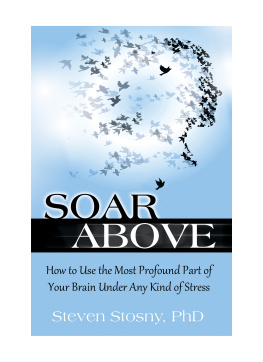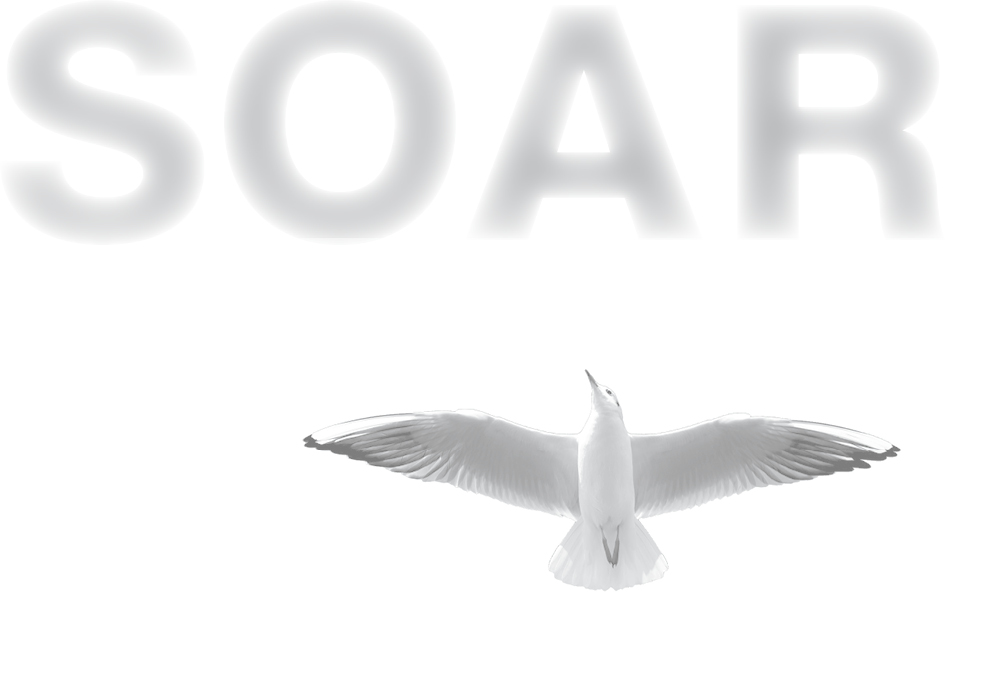SOAR
The Breakthrough Treatment for Fear of Flying
Captain Tom Bunn, MSW, LCSW
Lyons Press
Guilford, Connecticut
An imprint of Globe Pequot Press
Copyright 2013 by Tom Bunn, MSW, LCSW
ALL RIGHTS RESERVED. No part of this book may be reproduced or transmitted in any form by any means, electronic or mechanical, including photocopying and recording, or by any information storage and retrieval system, except as may be expressly permitted in writing from the publisher. Requests for permission should be addressed to Globe Pequot Press, Attn: Rights and Permissions Department, PO Box 480, Guilford, CT 06437.
Lyons Press is an imprint of Globe Pequot Press.
Layout: Maggie Peterson
Library of Congress Cataloging-in-Publication Data
Bunn, Tom.
SOAR : the breakthrough treatment for fear of flying / Captain Tom
Bunn, LCSW.
pages cm
1. Fear of flying. 2. Fear of flyingTreatmentPopular works. 3.
RelaxationStudy and teaching. I. Title.
RC1090.B86 2013
616.85'225dc23
2013015033
E-ISBN 978-1-4930-0068-5
The health information expressed in this book is based solely on the personal experience of the author and is not intended as a medical manual. The information should not be used for diagnosis or treatment, or as a substitute for prefessional medical care.
To the many anxious flyers who persevered, doing whatever it took to overcome fear of flyinglistening to you and learning from you helped me to develop the methods in this book.
We all encounter turbulence.
Engaging it, we cope.
Embracing it, we rise.
Dancing upon it, we soar!
Contents
Introduction
You are not alone. According to research, one person in three has difficulty flying. And, you are in good company. A lot of very accomplished people, some of them well-known, feel the same way you do about flying: prolific author Isaac Asimov, actress Whoopi Goldberg, comedian Jackie Gleason, former President of the United States Ronald Reagan, film director Stanley Kubrick, hockey star Wayne Gretzky, sportscaster John Maddenthe list is long.
Some tried psychotherapy in an effort to overcome this phobia. And while the therapy may have been helpful in many areas of their lives, they found, to their great disappointment, it did not help them conquer their fear of flying. You may have tried this route yourself. Others have attended workshops for fear of flying led by pilots with vast experience in the air. They explain the mechanics of flight. They point out how safe flying is. Though the statistics show the chance of being on a doomed flight is incredibly low, this rarely works. I know, because that approach was tried in the original fear-of-flying course at Pan Am led by my colleague Captain Truman Slim Cummings. I worked as a volunteer with his course.
I had joined Pan Am after seven years of flying the first supersonic jet fighter, the F-100, and the F-105 at a United States Air Force base in Germany. I flew DC-8s, 707s, and 747s at Pan Am, and later I flew 727s, 747s, 757s, and 767s at United Airlines. In all, airlines and Air Force together, I spent thirty-eight years in the air.
Recognizing the limitations of the Pan Am course, in 1982 I founded SOAR, Seminars On Aeroanxiety Relief, to find a more effective way to help people overcome the fear of flying. The addition of techniques based on Cognitive Behavioral Therapy was a huge step forward. Though no other program could match our level of success, there were still some clients we could not help. Continuing the search for a way to help everyone fly comfortably and confidently, I earned a masters degree at Fordham University, became licensed as a therapist, and then went on for several years of postgraduate study at the Gestalt Center of Long Island, the New York Training Institute for Neurolinguistic Programming, The Masterson Institute, and seminars on neurological research.
Coupled with years as an airline pilot, this advanced training in psychology gave me a unique perspective on how to help people overcome their fear of flying. Since feelings of anxiety, claustrophobia, and panic develop unconsciously and automatically, any effective solution would also have to work unconsciously and automatically. This took years to find. But, as brain scan technology began to reveal the inner workings of the mind, I was able to find a way to control feelings automatically when flying. Now, almost ten thousand people who were afraid to fly have the whole world open to them! It is a great satisfaction to receive their e-mails and share their joy. Here is an example:
I just wanted to write to thank you for the tremendous resource you provide, and to let you know that SOAR helped change my life. I used to cry from anxiety every time I boarded a plane and have nightmares every night for a week before flying. Today I fly 3 to 4 times a week (!!) for business and am an international speaker flying more than I ever thought possible. I would never have had the courage to pursue these opportunities without your course. I want to especially thank you for the free materials you provide online, as I first took your course when I was a starving graduate student making only $1,000 a month. I was not able to afford more expensive counseling, and you really changed my life. Ten years later, I still recommend your content to anxious fliers I meet, and I think of your lessons often when I fly. I just wanted you to know how grateful I am for your service to all of us anxious fliers, and you show so much compassion, wisdom, and kindness in sharing this help with us.
People all over the world have completed SOAR. There are clients in Australia, New Zealand, Japan, China, Thailand, India, Saudi Arabia, the United Arab Emirates, Poland, Greece, Italy, Germany, Switzerland, France, Brazil, the UK, Canada, and, of course, the United States. Available also in Spanish, SOAR has reached anxious fliers in Spain, Mexico, Argentina, Chile, Peru, and Ecuador, to mention a few countries. And now, for the first time, I am able to offer it to you in book form.
But why is flying such a problem? With the earth firmly beneath our feet, we can approach what attracts us, and withdraw from what unnerves us. If there is real danger, we can run. Mobility means security, both physically and emotionally. Flying takes away our most basic way of regulating feelings.
On the other hand, flight expands our mobility one-hundred fold! Rather than five mph on foot, we can cover five hundred mph when aloft. Thats marvelous. But, expanded mobility requires commitment. It necessitates placing our destiny in someone elses hands. It things go wrong, there is no escape. How could we possibly not have concern?
Anxiety begins when faced with making reservations. It increases as the flight approaches. Claustrophobiathe feeling of being trappedmay set in once the plane door closes. Takeoff gives rise to doubts. Is the plane struggling? Will it get off the ground only to fall back? Amazingly, the plane finds its way upward, suspended by some invisible means. As the initial crisis passes, a bigger challenge awaits. Here is how one client expressed it:
I could manage the takeoff mostly because it doesnt last that long and I loved the landing because the flight was almost over. It was the time in the air and the turbulence that struck fear and terror in my heart. Even when there was no turbulence, I was afraid that there would be, and that kept me in a high state of terror for the duration of the flight.


